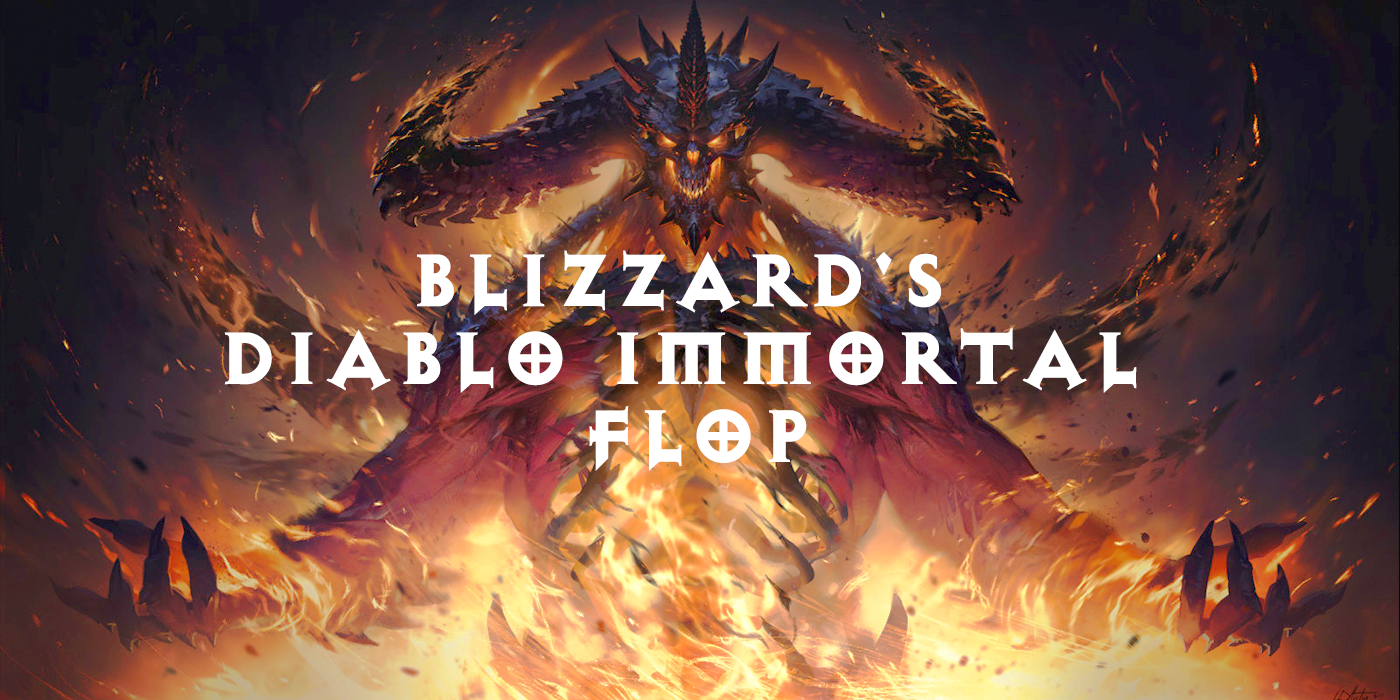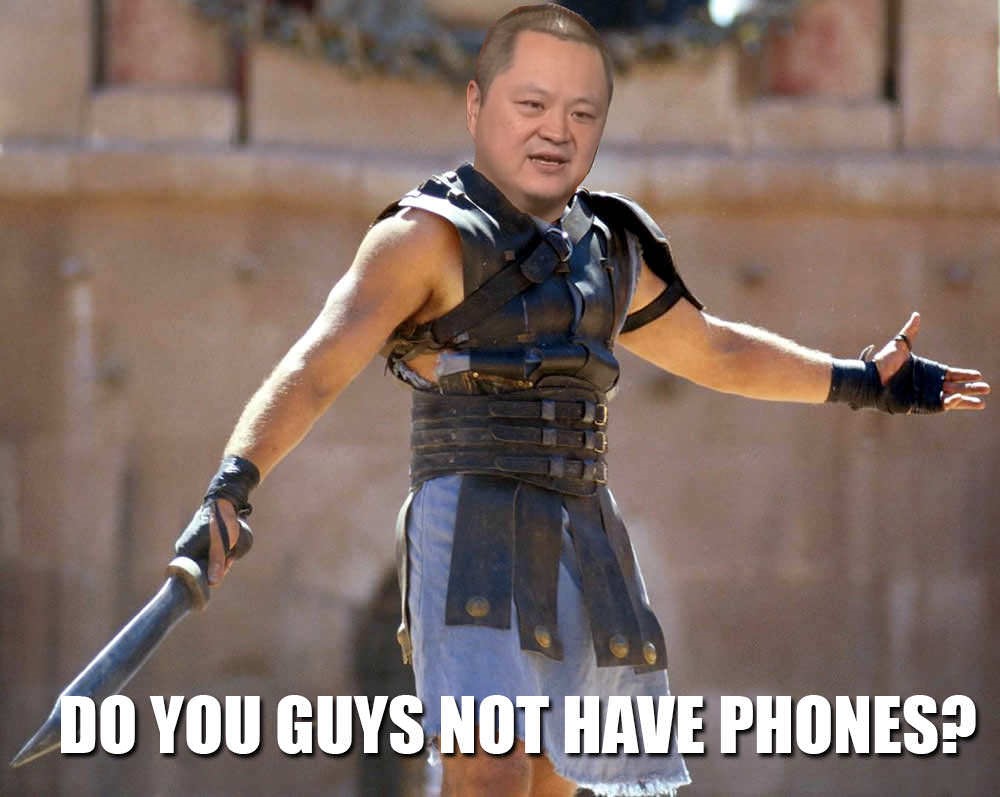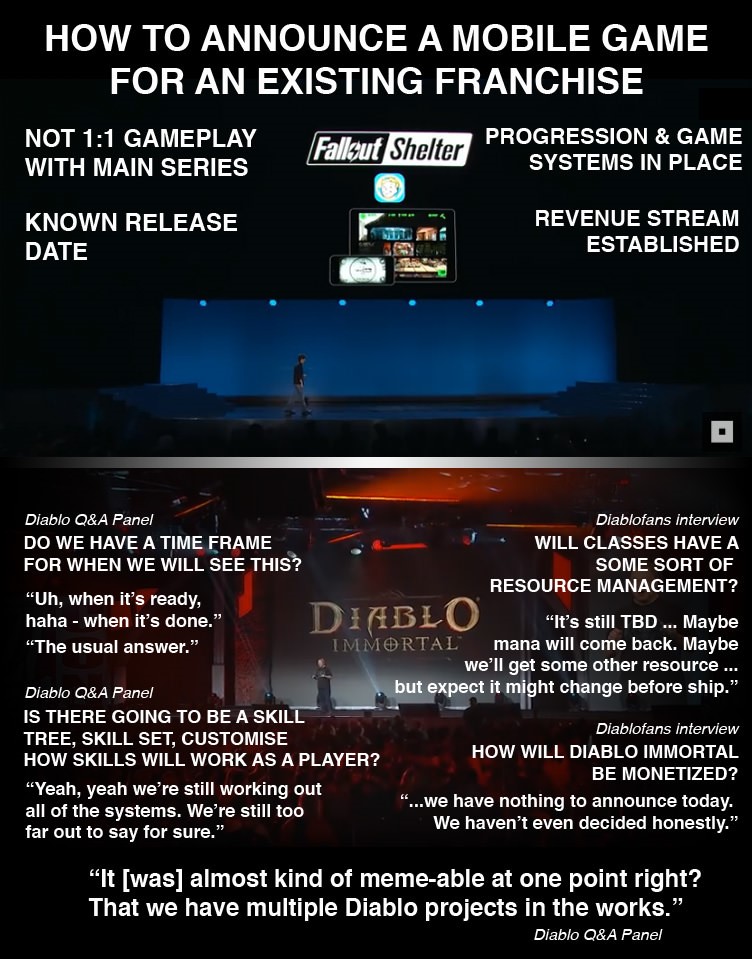The Diablo Immortal announcement at Blizzcon created quite a kerfuffle among Diablo Fans

Stay a while and listen: on November 2nd, 2018 mere minutes after BlizzCon’s opening ceremonies, a gaming first occurred. The first worldwide, public stream of game designers losing hope and innocence: Poor Wyatt Cheng and his team. Wyatt et al. are behind the now infamous, upcoming release within the Diablo franchise: Diablo Immortal. Though not the true perpetrators of pandering to market trends, the brave souls onstage took the brunt of the attack building up for years: The one meant for Blizzard’s corporate overlords. To understand them you need to understand Vivendi and Activision.
It is hard to pretend Blizzard is anything it used to be from the exact moment COD and Destiny 2 popped up in battle.net browsers. This isn’t the company that sponsored the unofficial expansion to Diablo 1, technically one of the first fan made mods. This is the company that wants real names on Battle.net and microtransaction based mobile games:
Hearthstone pack anyone?
Infinity Ward and Treyarch Studios COD drama aside, Activision was the force behind that and the subsequent firing of Infinity Wards’s founders: Vince Zampella and Jason West.
Metaphorically, if our beloved franchises are Sanctuary (Diablo, Warcraft, Starcraft) then Activision, simply put is Diablo. Vivendi, as you’ll find out below is Baal.
And somehow we ended up with…Enron’s Accountant as Mephisto?
Yeah, you’re gonna want to read this.
Incase you forgot about the Vivendi years, let’s tl:dr a few years to get up to speed:
During the restructuring of their newly acquired assets, Vivendi Games clashed with the leadership at Blizzard North: Erich and Max Schaefer, David Brevik, and the original face of Blizzard: Bill Roper. All four were the creators, creative deciders, and leaders behind Diablo up to that point (D1 to Diablo 2: LOD). They were the founders of Condor Games, the company that had been bought by Blizzard before the release of Diablo. They had already gone thru having their studio change ownership before.
They had plans on where to take Diablo, their creation, into its third installment.
They chose to resign rather than continue association with Vivendi.
The Schaefer brothers left to form the studio that would bring us Torchlight, Runic Studios. David Brevik went on to give us Hellgate: London (with Bill Roper) and Marvel Heroes. Bill Roper is now at Disney.
Somehow, Vivendi, while trying to save a few bucks decided to gut the goose that laid the golden egg rather than maim it.
How you ask?
Soon after the departures at Blizzard North, they were at it again over at Blizzard. Mike O’Brien, Patrick Wyatt and Jeff Strain were resigning as well. The talented trio were an enormous driving force behind not only the Diablo series, but Star Craft, War Craft, and Battle.net. Creative differences are speculated to be behind the departures. They came up with the concept of an MMORPG that you only have to pay for once. They leave and World of Warcraft is released as a subscription based game, after purchase. It’s also what most speculate was the reason for their departure from Blizzard, where they would have been developing that very game.
Most speculate this led to the exodus of a full WoW development team once Mike, Patrick, and Jeff had set up ArenaNet to house them. ArenaNet comes out with Guild Wars a pay once MMORPG, and revolutionizes the genre forever.
Now reviled rather than respected, Vivendi Games began a string of assumed identities like an inductee into some sort of corporate witness protection program.
tl:dr Vivendi changed their name and restructured 5 times in under 5 years.
Any first year business student knows, restructuring means new budgets, and new budgets means cutting costs. Sadly, it’s not “Gameplay First”, as Vivendi executives take their bonuses and gut Blizzard without blinking an eye.


Not only did their executives take their bonuses, they even paid out a resigning one as well. The bonuses are paid out even with the 1 billion Euro loss: leaving many to question how they justified bonuses to their shareholders. Long-term debt is stated in the hundreds of millions of Euros as well, how did Vivendi stay afloat?

The document being referred to is federally required yearly by the SEC, with data that needs to be audited by a licensed firm or individual.
So why does this document list their own accounting firm as one of the threats facing the company (pg. 9)?
How did the growth from 1999 to 2000 disappear?
Was it really even there to begin with?
Because this growth was recorded by a sub-division of Andersen Worldwide: the surviving Swiss branch of Arthur Andersen LLP.
Why is that name familiar?
Arthur Andersen LLP made headlines in 2001 for covering up for Enron, a Texas-based energy company.
To those unfamiliar with the Enron scandal, it was a big deal at the time. Enron falsified accounting records and hid debt, all while pumping up their stock price.
How did they keep a thing like this going?
Via a combination of intimidating whistleblowers, bribes, and their accounting firm Arthur Andersen LLP.
Andersen LLP was indicted, convicted, and dissolved. The only surviving branch from that rotten corporate tree is Andersen Worldwide, the company that filed and audited Vivendi’s 10k reports for years.
Reviled to the extent nobody would touch them, Vivendi Games had few suitors when Vivendi Universal had placed them on the chopping block.
When they merged with Activision, they had veritably no other choice. At the time, Vivendi was a fast sinking ship due to rushed titles and poor market research: Blockbusting games like Barbie on the Gameboy, Fight Club, and 50 Cent: Bulletproof.
Activision on the other hand, has historically had poor leadership and branding compared to when they were the 3rd party publisher darling of the 80’s. The treatment of the founders of Infinity Ward and the subsequent milking of the COD franchise is a prime example of this change.
It was speculated that it was Activision’s intent to hide their almost villainous reputation behind Blizzard, and Blizzard North’s successes. This changed their union from Activision Vivendi, a branding cyanide capsule to the softer Activision Blizzard.
Now explained, it’s familiar now to hear that Blizzard wouldn’t be using their own developers for Diablo: Immortal. Blizzard quit being loyal to their employees long before they quit on their fans.
Activision continues its strategy by hiring a new studio on old IP, The “Treyarch” maneuver. Then cuts costs by outsourcing to China.
It’s cheaper to pay NetEase rather than paying the higher salaries in Blizzard’s California locations.
Though cheaper overall, won’t having a translator between design and development make things difficult?
Most fans worry simple obstacles like this will keep the title either a mediocre clone or a pay-to-win nightmare.
Making it doubtful there will be any kind of innovation to the genre like the Diablo series was famous for.
Save money on wages for more bonus money and show footage of a re-skin of another game?
Yep, that’s right up Blizzard’s alley these days.
“Don’t you guys have a phone?”
Greeted with an audible ‘BOO’ as the team announced Immortal would be a “mobile only” game, became even more cringe worthy later on.

The memes started pouring in. First some stills of the only empty lines at BlizzCon:

Those confident enough to announce Lucio Oh’s and Diablo: Immortal at the same BlizzCon didn’t do their homework. Only their most loyal, hardcore fanbase attends BlizzCon. If you can’t sell the idea there, where can you make it work? The Internet is definitely the wrong choice, and censoring your fans is worse.
But, the real sad thing is Diablo Immora…the game might succeed in Asian markets, if it releases.
NetEase has the distribution and marketing system in place. The prices are affordable when split into microtransactions.
This shifts a target audience from gamers like us to almost everyone. While most people still don’t have enough money for a PC but they do have a decent cellphone. The bar for mobile games is low. Most are pay-to-win nightmares meaning most mobile games are mediocre. Each a clone of some other popular game, with no overall innovation, and a price tag requirement to win instead of skill.
Addictive and only rewarding the consumer pleasure centers of our brains, most mobile games target the lowest common denominator.
Censoring gamers is a far worst idea than Diablo on mobile. The noise the fans are making was heard and will continue to be heard. Blizzard’s stock dropped to a yearly low: shared discontent can suddenly be measured in a language Activision Vive…Blizzard executives can understand, cash.
The memes don’t stop rolling in:

The language shifted from “entitltled gamers” to damage control.
Fans aren’t convinced that “There are other Diablo projects in the works”, because they’ve waited for titles from Blizzard before and gotten nothing.
Fans did get their videos removed, dislikes/downvotes erased, and answered vaguely.
Nintendo Switch gets a new D3 port. Cash Cow level included.
Meanwhile, diehard Blizzard fans get to pay over $30 for the ability to watch online, sitting there helplessly like South Park kids watching Indiana Jones 4.
Dear Blizzard, you’re not the company you used to be and haven’t been for a while.
By the numbers (as of Nov. 7):
Effect on Stock Price: ~$5-7 Loss (~$69/70 to ~$63-65)
Number of times #NoKingRulesForever post is removed from YouTube: 15
(Shout-out to RedPill Shark for an awesome set of posts)
Total Views: 3,578,039
Lowest # of Downvotes: 50k
Highest # of Downvotes: 489k
Did I forget something or do you have a comment to share?
Join the conversation below!
